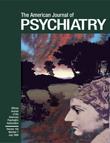Fetal Alcohol Exposure and Adult Psychiatric Disorders
To the Editor: Chris Famy, B.S., and colleagues (1) reported on mental illness in adults with fetal alcohol syndrome or fetal alcohol effects. This report seems timely because there is little study of adult psychiatric sequelae of such neurodevelopmental disorders, although such sequelae may be common, as suggested by this study.
Yet, this was a preliminary study because it was descriptive rather than controlled. Furthermore, the final group size was small and most probably biased by selection, because the more severely ill subjects were excluded—i.e., the 9% that were (at least mildly) mentally retarded. Even if this was meant to control for the usual psychiatric comorbidity of any mental retardation, no explanation was provided for the relatively small percentage of individuals with arrested mental development, which is reported to be about 50% or more in persons with fetal alcohol syndrome and fetal alcohol effects (2). In addition, the severity of psychiatric symptoms was not established (by standard means such as self-report and clinician-rated questionnaires). Further studies should address these issues and control for environmental confounders by comparing subjects with fetal alcohol exposure who developed in different environments, as well as subjects with and without fetal alcohol exposure who developed in similar environments. Different alcohol- and non-alcohol-related neurodevelopmental disorders should also be compared. The long-range (adult) psychiatric impact on the fetus of moderate and binge drinking during pregnancy—which do not result in fetal alcohol syndrome or fetal alcohol effects—should be studied, considering that such maternal alcohol drinking has been empirically associated with learning problems and with the lowering of IQs in children exposed to alcohol in this way during fetal development (3).
An interesting finding of this report is that schizophrenia, in contrast with other psychotic disorders, was not observed in the adults with clinically significant fetal alcohol exposure. This finding may be incidental or because of the small group studied. A more interesting explanation may be that the neuropathology caused by fetal alcohol exposure is different from the neuropathology of schizophrenia. This is compatible with evidence from animal and human studies of diffuse—but especially limbic system and midline—brain damage in utero because of alcohol use (4–6), whereas negative syndrome (nonpsychotic) schizophrenia manifests especially as frontal lobe dysfunction (7). Such comparisons provide important information linking different clinical disorders to distinct neuropathological lesions and should be extensively studied for psychiatric and neurodevelopmental disorders in order for both to be better understood and treated.
1. Famy C, Streissguth AP, Unis AS: Mental illness in adults with fetal alcohol syndrome or fetal alcohol effects. Am J Psychiatry 1998; 155:552–554Link, Google Scholar
2. Autti-Ramo I, Korkman M, Hllakivl-Clarke L, Lehtonen M, Halmesmaki E, Granstrom ML: Mental development of 2-year-old children exposed to alcohol in utero. J Pediatr 1992; 120:740–746Crossref, Medline, Google Scholar
3. Streissguth AP, Barr HM, Sampson PD: Moderate prenatal alcohol exposure: effects on child IQ and learning problems at age 7 1/2 years. Alcohol Clin Exp Res 1990; 14:662–669Crossref, Medline, Google Scholar
4. Abel EL, Jacobson S, Sherwin BT: In utero alcohol exposure: functional and structural brain damage. Neurobehav Toxicol Teratol 1983; 5:363–366Medline, Google Scholar
5. Lewis PD: Neuropathological effects of alcohol on the developing nervous system. Alcohol 1985; 20:195–200Google Scholar
6. Swayze VW, Johnson VP, Hanson JW, Piven J, Sato Y, Giedd JN, Mosnik D, Andreasen NC: Magnetic resonance imaging of brain anomalies in fetal alcohol syndrome. Pediatrics 1997; 99:232–240Crossref, Medline, Google Scholar
7. Buchsbaum MS: The frontal lobes, basal ganglia, and temporal lobes as sites for schizophrenia. Schizophr Bull 1990; 16:377–387Crossref, Medline, Google Scholar



